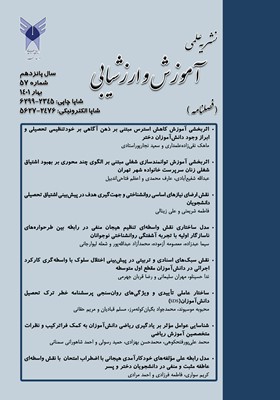نقش ارضای نیازهای اساسی روانشناختی و جهتگیری هدف در پیشبینی اشتیاق تحصیلی دانشجویان
محورهای موضوعی : روانشناسی تربیتیفاطمه شریعتی 1 , علی زینالی 2 *
1 - کارشناسی ارشد روانشناسی تربیتی، گروه روانشناسی، واحد ارومیه، دانشگاه آزاد اسلامی، ارومیه، ایران
2 - دانشیار، گروه روانشناسی، واحد خوی، دانشگاه آزاد اسلامی، خوی، ایران
کلید واژه: جهتگیری هدف, نیازهای اساسی روانشناختی, اشتیاق تحصیلی,
چکیده مقاله :
پژوهش حاضر با هدف تعیین نقش ارضای نیازهای اساسی روانشناختی و جهتگیری هدف در پیشبینی اشتیاق تحصیلی دانشجویان انجام شد. این مطالعه مقطعی از نوع همبستگی بود. جامعه پژوهش همه دانشجویان دانشگاه آزاد اسلامی واحد ارومیه در سال تحصیلی 99-1398 به تعداد 13000 دانشجو بودند که بر اساس فرمول کوکران از میان آنها 400 دانشجو با روش نمونهگیری در دسترس بهعنوان نمونه انتخاب شدند. ابزارهای پژوهش مقیاس ارضای نیازهای اساسی روانشناختی (دسی و ریان، 2000)، مقیاس تجدیدنظرشده جهتگیری هدف (الیوت و موریاما، 2008) و پرسشنامه اشتیاق تحصیلی (اسکافیلی و همکاران، 2002) بود. دادهها با روشهای ضرایب همبستگی پیرسون و رگرسیون چندگانه با مدل همزمان در نرمافزار SPSS-19 تحلیل شدند. یافتهها نشان داد که نیاز به خودمختاری، شایستگی و ارتباط و جهتگیری هدف تسلطی گرایشی، تسلطی اجتنابی، عملکردی گرایشی و عملکردی اجتنابی با اشتیاق تحصیلی رابطه مثبت و معنادار داشتند. همچنین، متغیرهای ارضای نیازهای اساسی روانشناختی و جهتگیری هدف بهطور معنیداری توانستند 63 درصد از تغییرات اشتیاق تحصیلی را پیشبینی کنند (05/0>P) که در این پیشبینی متغیرهای نیاز به شایستگی و اهداف عملکردی گرایشی و اجتنابی اثر معناداری نداشتند (05/0<P). بنابراین، برای بهبود اشتیاق تحصیلی دانشجویان میتوان نیازهای اساسی روانشناختی را ارضا کرد و هر یک از جهتگیریهای هدف را آموزش داد که ارضای نیاز به خودمختاری و آموزش هدف تسلطی گرایشی اولویت دارد.
Present research aimed to determine the role of satisfying of basic psychological needs and goal orientation in predicting academic engagement of university students. This study was cross-sectional from type of correlation. The research population was all students of Islamic Azad University of Urmia branch in 2019-20 academic years with number of 13000 students, which from them based on Cochran's formula 400 students were selected by available sampling method as a sample. The research instruments were the satisfying of basic psychological needs scale (Deci & Ryan, 2000), revised goal orientation scale (Elliot & Murayama, 2008) and academic engagement questionnaire (Schaufeli & et al, 2002). Data were analyzed by Pearson correlation coefficients and multiple regression with enter model in SPSS-19 software. The findings showed that need to autonomy, competence, relatedness and goal orientation of mastery approach, mastery avoidance, performance approach and performance avoidance had a positive and significant relationship with academic engagement. Also, the variables of satisfying of basic psychological needs and goal orientation significantly could 63 percent of variance of academic engagement (P<0.05) that in this prediction the variables of need to competence and performance goals of approach and avoidance had not significant effect (P>0.05). Therefore, to improve the academic engagement of students can be satisfied the basic psychological needs and taught each of the goal orientation, which satisfying the need to autonomy and teaching mastery approach goal should be priority

